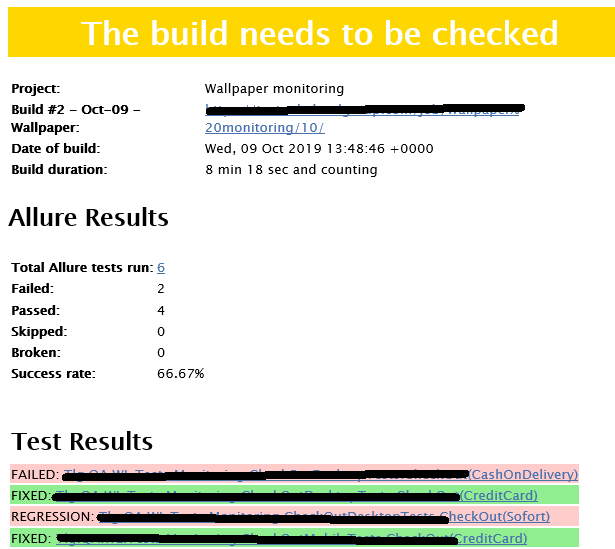To expand on this answer:
Write a Groovy template for Email Ext plugin instead of Jelly template.
In Editable Email Notification content
- set content type to "HTML" or "Both HTML and Plain Text"
and include the groovy script like this:
${SCRIPT, template="test.groovy"}
put the groovy script in email-templates home e.g.
/var/lib/jenkins/email-templates. see below test.groovy.
In the example below every test is iterated by getting each of these objects: '''junitResult.getChildren()'''. If one desired to iterate only failed tests then junitResult.getFailedTests() could be used. See the hudson.tasks.junit.TestResult API: http://hudson-ci.org/javadoc/hudson/tasks/junit/PackageResult.html also see http://hudson-ci.org/javadoc/hudson/model/Build.html
Collection<ClassResult> getChildren()
List<CaseResult> getFailedTests()
Example/template from email-ext-plugin can be seen here:
https://github.com/jenkinsci/email-ext-plugin/blob/master/src/main/resources/hudson/plugins/emailext/templates/groovy-html.template
This example shows summary test result and table for results for each test suite and individual test. test.groovy:
<html>
<body>
<%
import hudson.model.*
def build = Thread.currentThread().executable
def buildNumber = build.number
def buildNumHash = build.getDisplayName()
def testCount = "0"
def testPassed = "0"
def testFailed = "0"
def testSkipped = "0"
def buildDuration = "0"
if(build.testResultAction) {
def testResult = build.testResultAction
testCount = String.format("%d",(testResult.totalCount))
testPassed = String.format("%d",(testResult.result.passCount))
testFailed = String.format("%d",(testResult.result.failCount))
testSkipped = String.format("%d",(testResult.result.skipCount))
testDuration = String.format("%.2f",(testResult.result.duration ))
}
def workspace = build.getEnvVars()["WORKSPACE"]
def buildName = build.getEnvVars()["JOB_NAME"]
def BUILD_STATUS = build.getEnvVars()["BUILD_STATUS"]
def BUILD_URL = build.getEnvVars()["BUILD_URL"]
def testResult = hudson.tasks.junit.TestResult
def testResult2 = build.getAction(hudson.tasks.junit.TestResultAction.class)
%>
start test.groovy <br><br>
<b>TEST RESULT:</b> $testCount total, <b>$testPassed pass</b>, <b>$testFailed fail</b>, $testSkipped skip.<br>
Workspace : $workspace<br>
Project Name : $buildName $buildNumHash<br><br>
<!-- GENERAL INFO -->
<TABLE>
<TR><TD align="right">
<j:choose>
<j:when test="${build.result=='SUCCESS'}">
<IMG SRC="${rooturl}static/e59dfe28/images/32x32/blue.gif" />
</j:when>
<j:when test="${build.result=='FAILURE'}">
<IMG SRC="${rooturl}static/e59dfe28/images/32x32/red.gif" />
</j:when>
<j:otherwise>
<IMG SRC="${rooturl}static/e59dfe28/images/32x32/yellow.gif" />
</j:otherwise>
</j:choose>
</TD><TD valign="center"><B style="font-size: 200%;">BUILD ${build.result}</B></TD></TR>
<TR><TD>Build URL</TD><TD><A href="${rooturl}${build.url}">${rooturl}${build.url}</A></TD></TR>
<TR><TD>Project:</TD><TD>${project.name}</TD></TR>
<TR><TD>Date of build:</TD><TD>${it.timestampString}</TD></TR>
<TR><TD>Build duration:</TD><TD>${build.durationString}</TD></TR>
<TR><TD>Test duration:</TD><TD>${testDuration}</TD></TR>
</TABLE>
<BR/>
<!-- JUnit TEMPLATE hudson.tasks.junit.TestResult -->
<% def junitResultList = it.JUnitTestResult
try {
def cucumberTestResultAction = it.getAction("org.jenkinsci.plugins.cucumber.jsontestsupport.CucumberTestResultAction")
junitResultList.add(cucumberTestResultAction.getResult())
} catch(e) {
//cucumberTestResultAction not exist in this build
}
// API: http://hudson-ci.org/javadoc/hudson/tasks/junit/PackageResult.html
%>
<!-- JUnit TEMPLATE: all tests PASS FAIL SKIP >
<%
if (junitResultList.size() > 0) { %>
<TABLE width="100%">
<TR><TD class="bg1" colspan="2"><B>${junitResultList.first().displayName}</B></TD></TR>
<% junitResultList.each{
junitResult -> %>
<% junitResult.getChildren().each { packageResult -> %>
<TR><TD class="bg2" colspan="2"> <B>TEST SUITE: ${packageResult.getName()} Failed: ${packageResult.getFailCount()} test(s), Passed: ${packageResult.getPassCount()} test(s)</B>, Skipped: ${packageResult.getSkipCount()} test(s), Total: ${packageResult.getPassCount()+packageResult.getFailCount()+packageResult.getSkipCount()} test(s)</TD></TR>
<% packageResult.getChildren().each{ suite ->
suite.getChildren().each{ test ->
def colour = "lightgreen"
def highlight1=""
def highlight2=""
RESULT = test.getStatus() // FAILED or PASSED or SKIPPED
if (RESULT == hudson.tasks.junit.CaseResult.Status.FAILED || RESULT == hudson.tasks.junit.CaseResult.Status.REGRESSION) {
colour = "#ffcccc"
highlight1="<B>"
highlight2="</B>"
}
if (RESULT == hudson.tasks.junit.CaseResult.Status.SKIPPED) { colour = "#ffffb3" }
%>
<TR bgcolor="${colour}"><TD class="test" colspan="2">${highlight1}<li>${RESULT}: ${test.getFullName()} </li>${highlight2}</TD></TR>
<% } }
}
} %>
</TABLE>
<BR/>
<%
} %>
end of test.groovy
</body>
</html>
e.g. output (text only no colours/formatting)
start test.groovy
TEST RESULT: 18 total, 18 pass, 0 fail, 0 skip.
Workspace : /var/lib/jenkins/jobs/jobname-1/workspace
Project Name : jobname-1 #20
BUILD SUCCESS
Build URL http://jenkinsurl:port/job/jobname-1/20/
Project: jobname-1
Date of build: Mon, 23 Jan 2017 09:29:00 +0000
Build duration: 10 min
Test duration: 267.12
Test Results
TEST SUITE: suitename1 Failed: 0 test(s), Passed: 3 test(s), Skipped: 0 test(s), Total: 3 test(s)
* PASSED: suitename1.testclass.testname1
* PASSED: suitename1.testclass.testname2
* PASSED: suitename1.testclass.testname3
TEST SUITE: suitename2 Failed: 2 test(s), Passed: 1 test(s), Skipped: 0 test(s), Total: 3 test(s)
* PASSED: suitename2.testclass.testname1
* FAILED: suitename2.testclass.testname2
* REGRESSION: suitename2.testclass.testname3
end of test.groovy

